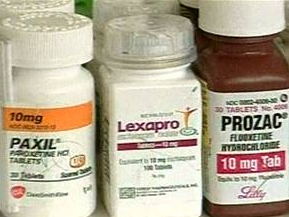Antidepressants Pills Names
Antidepressants Pills Names
Antidepressants are drugs used for the treatment of major depressive disorder and other conditions, including dysthymia, anxiety disorders, obsessive compulsive disorder, eating disorders, chronic pain, neuropathic pain and, in some cases, dysmenorrhoea, snoring, migraines, attention-deficit hyperactivity disorder (ADHD), substance abuse and sleep disorders. They can be used alone or in combination with other medications.The most important classes of antidepressants are the selective serotonin reuptake inhibitors (SSRIs), serotonin–norepinephrine reuptake inhibitors (SNRIs), tricyclic antidepressants (TCAs) and monoamine oxidase inhibitors (MAOIs). Other drugs used or proposed for the treatment of depression include buprenorphine, low-dose antipsychotics, and St John's wort
List of antidepressants
This is a complete list of clinically-approved antidepressants, as well as drugs used to augment antidepressants, by pharmacological and/or structural classification. Chemical/generic names are listed first with brand names in parentheses.Selective serotonin reuptake inhibitors (SSRIs)
- Citalopram (Celexa)
- Escitalopram (Lexapro, Cipralex)
- Paroxetine (Paxil, Seroxat)
- Fluoxetine (Prozac)
- Fluvoxamine (Luvox)
- Sertraline (Zoloft, Lustral)
Serotonin-norepinephrine reuptake inhibitors (SNRIs)
- Desvenlafaxine (Pristiq)
- Duloxetine (Cymbalta)
- Levomilnacipran (Fetzima)
- Milnacipran (Ixel, Savella)
- Tofenacin (Elamol, Tofacine)
- Venlafaxine (Effexor)
Serotonin modulators and stimulators (SMSs)
- Vilazodone (Viibryd)
- Vortioxetine (Brintellix)
Serotonin antagonists and reuptake inhibitors (SARIs)
- Etoperidone (Axiomin, Etonin)
- Trazodone (Desyrel)
Nefazodone (Nefadar, Serzone) was also formerly used as an antidepressant, but was withdrawn from the market.
Norepinephrine reuptake inhibitors (NRIs)
- Reboxetine (Edronax)
- Viloxazine (Vivalan)
Tricyclic antidepressants (TCAs)
- Amitriptyline (Elavil, Endep)
- Amitriptylinoxide (Amioxid, Ambivalon, Equilibrin)
- Clomipramine (Anafranil)
- Desipramine (Norpramin, Pertofrane)
- Dibenzepin (Noveril, Victoril)
- Dosulepin (Prothiaden)
- Doxepin (Adapin, Sinequan)
- Imipramine (Tofranil)
- Lofepramine (Lomont, Gamanil)
- Melitracen (Dixeran, Melixeran, Trausabun)
- Nitroxazepine (Sintamil)
- Nortriptyline (Pamelor)
- Noxiptiline (Agedal, Elronon, Nogedal)
- Pipofezine (Azafen/Azaphen)
- Protriptyline (Vivactil)
- Trimipramine (Surmontil)
The following are also TCAs, but are atypical pharmacologically:
- Opipramol (Insidon) – sigma receptor agonist
- Tianeptine (Stablon) – unknown/unclear mechanism of action
Tiazesim (Altinil) is not a TCA, but is a bicyclic antidepressant that is closely related structurally and pharmacologically. Similarly to many TCAs, it is no longer marketed.
Tetracyclic antidepressants (TeCAs)
- Amoxapine (Asendin)
- Maprotiline (Ludiomil)
- Mianserin (Bolvidon, Norval, Tolvon)
- Mirtazapine (Remeron)
- Setiptiline (Tecipul)
Monoamine oxidase inhibitors (MAOIs)
Irreversible
Non-selective
- Isocarboxazid (Marplan)
- Phenelzine (Nardil)
- Tranylcypromine (Parnate)
Selective for MAO-B
- Selegiline (Eldepryl, Zelapar, Emsam)
Reversible
Non-selective
Caroxazone (Surodil, Timostenil) was formerly used as an antidepressant, but has been discontinued.Selective for MAO-A
- Metralindole (Inkazan)
- Moclobemide (Aurorix, Manerix)
- Pirlindole (Pirazidol)
- Toloxatone (Humoryl)
Eprobemide (Befol) and minaprine (Brantur, Cantor) were also formerly used as antidepressants, but have been discontinued.
Others
Marketed
- Agomelatine (Valdoxan) – 5-HT2C receptor antagonist and MT1 and MT2 receptor agonist; sometimes described as a norepinephrine-dopamine disinhibitor (NDDI)
- Amisulpride (Solian) – D2, D3, and 5-HT7 receptor antagonist and GHB receptor ligand – specifically approved for dysthymia
- Buprenorphine (Subutex, Temgesic, Buprenex) – κ-opioid receptor antagonist and μ-opioid receptor partial agonist – not specifically approved for depression (used off-label)
- Bupropion (Wellbutrin) – NRI and non-competitive antagonist of multiple neuronal nACh receptors
- Ketamine (Ketalar) – non-competitive NMDA receptor antagonist – not specifically approved for depression (used off-label)
- Lurasidone (Latuda) – 5-HT1A receptor partial agonist, 5-HT2, 5-HT7, D2, α1-adrenergic, and α2-adrenergic receptor antagonist – specifically approved for bipolar depression
- Tandospirone (Sediel) – 5-HT1A receptor partial agonist
- Teniloxazine (Lucelan, Metatone) – NRI and 5-HT2A receptor antagonist
Discontinued/withdrawn from the market
- Etryptamine (Monase) – serotonin-norepinephrine-dopamine releasing agent (SNDRA) and non-selective serotonin receptor agonist
- Medifoxamine (Cledial, Gerdaxyl) – dopamine reuptake inhibitor (DRI) and 5-HT2A receptor antagonist
- Metryptamine (Indopan) – SNDRA and non-selective serotonin receptor agonist
- Nomifensine (Merital, Alival) – NDRI
- Oxaflozane (Conflictan) – 5-HT1A, 5-HT2A, and 5-HT2C receptor agonist
Over-the-counter
The following antidepressants are available both with a prescription and over-the-counter:- Ademetionine [S-Adenosyl-L-methionine (SAMe)] (Heptral, Transmetil, Samyl)
- Hypericum perforatum [St. John's Wort (SJW)] (Jarsin, Kira, Movina)
- Oxitriptan [5-Hydroxytryptophan (5-HTP)] (Cincofarm, Levothym, Triptum)
- Tryptophan (Tryptan, Optimax, Aminomine)
Adjunctive treatments
This category includes drugs that are generally not considered to be significantly effective as treatments for depression alone, but have demonstrated effectiveness in the augmentation of other antidepressants.Atypical antipsychotics
- Aripiprazole (Abilify)
- Lurasidone (Latuda)
- Olanzapine (Zyprexa)
- Quetiapine (Seroquel)
- Risperidone (Risperdal)
- Ziprasidone (Geodon)
Others
- Buspirone (BuSpar) – 5-HT1A receptor partial agonist
- Lithium (Eskalith, Lithobid) – mood stabilizer; exact mechanism of action unknown
- Thyroxine (T4) – thyroid hormone (THR agonist)
- Triiodothyronine (T3) – thyroid hormone (THR agonist)
Combination products
- Amitriptyline/perphenazine – TCA and typical antipsychotic combination
- Flupentixol/melitracen (Deanxit) – TCA and typical antipsychotic combination
- Olanzapine/fluoxetine (Symbyax) – SSRI and atypical antipsychotic combination
Currently in clinical trials (investigational)
- ALKS-5461 (buprenorphine/samidorphan) – κ-opioid receptor antagonist
- Amitifadine (DOV-21,947, EB-1010) – serotonin-norepinephrine-dopamine reuptake inhibitor (SNDRI)
- Basimglurant (RG7090) – mGlu5 receptor negative allosteric modulator
- CERC-301 (MK-0657) – NMDA receptor subunit 2B (NR2B) antagonist
- Decoglurant (RG1578) – mGlu2 and mGlu3 receptor negative allosteric modulator
- Esketamine – non-competitive NMDA receptor antagonist
- GLYX-13 – NMDA receptor glycine site partial agonist
- LY-2456302 – κ-opioid receptor antagonist
- NRX-1074 – NMDA receptor glycine site partial agonist
- NSI-189 – hippocampal neurotrophin; exact mechanism of action unknown
- RO4491533 – mGlu22 and mGlu3 receptor negative allosteric modulator
- Tedatioxetine (Lu AA24530) – SNDRI and 5-HT2A, 5-HT2C, 5-HT3, and α1A-adrenergic receptor antagonist
- Tramadol (ETS6103/Viotra) – μ-opioid receptor agonist, δ- and κ-opioid receptor ligand, serotonin releasing agent (SRA), NRI, 5-HT2C receptor antagonist, NMDAR antagonist, α7 nAChR antagonist, M1 and M3 receptor antagonist, and TRPV1 agonist.
Antidepressants Pills Names
This information about antidepressants, take in the sites:
http://www.nhs.uk/conditions/Antidepressant-drugs/Pages/Introduction.aspx
http://en.wikipedia.org/wiki/List_of_antidepressants
Before treatment antidepreesantami, you should consult a physician.
Labels: Antidepressant Drugs, antidepressants pills names, list of antidepressants











